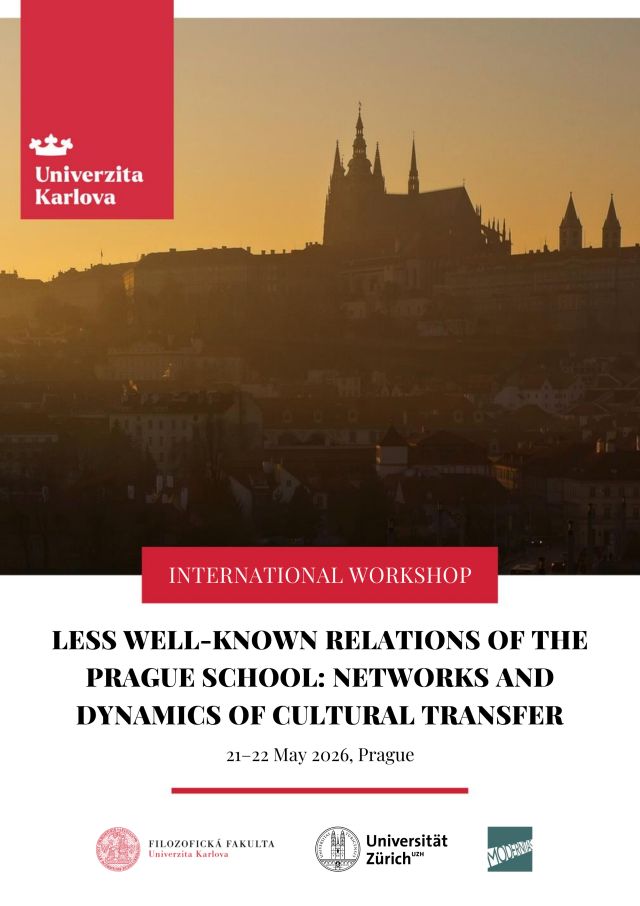Call for Papers "Less Well-Known Relations of the Prague School: Networks and Dynamics of Cultural Transfer"
Prague, 21-22 May 2026, Charles University in Prague.
This workshop is co-organised by MODERNITAS (MSH ULB), Charles University in Prague and University of Zürich.
The research dedicated to the development of linguistic and literary theories within the context of intercultural exchange brings significant contributions to the current state of scholarship (Sériot 1999; Archaimbault 2011, Mrugalski – Shahadat – Wutsdorff – Ulicka 2023). The importance of the concept of “cultural transfer”, widely explored in francophone and German literary studies, also proves fruitful when applied to phenomena such as the Prague School. The notion of “transfer” itself takes on various forms – from the idea of individuals embodying this function, such as Roman Jakobson (Glanc 2023; Mecco 2022), to the migration of theoretical concepts (Flack 2023; Lachmann 2023; Pilshchikov 2024). To this must be added the phenomenon of emigration, which led to new developments in structuralism. The methodological framework of the historiography of linguistics (Koerner 1978) allows to grasp the developmental aspects and the historical positioning of individuals more precisely in cultural exchange (Joseph 2024), or to assess certain rhetorical strategies (Puech 2015).
From its very beginning, the Prague School aimed to be international, and its members established pivotal connections with other scientific contexts. Some of these connections have been described in detail, while others have received little attention so far. On the one hand, this includes the role of lesser-known members of the Prague School, particularly their role in constructing scientific networks (e.g., Luis Brun, Noémi Ripka-Schlochow, Ľudovít Novák), and on the other hand, the links to entire fields of scholarly inquiry.
In this regard, a significant topic is the relation between the Prague School and the germanophone scientific sphere (Ehlers 2005), e.g., Czech germanophone periodicals played a pivotal role in the dissemination of the activities of the Prague School both inside and outside Czechoslovakia (Bernátek 2016). The relations with francophone linguistics also requires more precise research, namely concerning differences between the connection to the Geneva circle (Čermák 2003) and that to the Parisian context, represented in particular by the Société de linguistique de Paris (Sériot 1999; Testenoire 2015). Relations with specific figures, such as Émile Benveniste or Lucien Tesnière, emphasise the nature of the “transfer” as the specific process for the establishment of scholarly contacts (Krásová – Koblížek 2019).
The networks with anglophone linguistics are only partially researched (Prochazka 2010) and call for further investigation. Of note is, for example, Vilém Mathesius’ interest in the anglophone literary and linguistic context, as testified by the reception of works by Henry Sweet, Arthur Lloyd James or John Rupert Firth. The interest of the members of the Prague School was especially oriented towards anglophone research in phonetics. Regarding this, Bohumil Trnka described as pivotal the participation of Prague School members in the Second International Congress of Phonetics, promoted by Daniel Jones in London in 1935.
Another question are the relations between the Prague School and Northern countries, e.g., those between Prague, Louis Hjelmslev’s Copenhagen (Cigana 2022) and Oslo, where the linguist Alf Sommerfelt and the slavist Olaf Broch were active (Bjørnflaten 2012). These relations are the evolution of those already established before the independence of Czechoslovakia in 1918. Furthermore, the connections between the Prague School and the Polish context (Ulicka 2020), as well as the Prague milieu of Ukrainian émigrés, remain insufficiently explored. The role played within the Prague School by significant figures such as Dmytro Čyževs’kyj (Blashkiv – Mnich 2016) or Agenor Artymovyč has remains to be further investigated. We may also consider topics that have already been partially studied, such as the relations between the Prague School and Russian linguists. An important question is that of the relationship between Russian formalism and the Prague School, in which the 1928 manifesto by Jurij Tynjanov and Roman Jakobson occupies a privileged place (Depretto 2009). In this case there is a noticeable tendency to focus primarily on figures like Nikolaj Trubeckoj or Sergej Karcevskij while other important names, such as Petr Bogatyrev, are often overlooked, and the contributions of so-called “minor” figures, such as Anton Florovskij or Nikolaj Losskij, are not adequately considered.
The role of the International Congresses of Linguists and other scientific meetings, e.g., the First Congress of Slavic Philologists (Prague 1929) or the Réunion phonologique internationale (Prague 1930), should not be underestimated; on the contrary, it should be more acknowledged, since these congresses had a crucial importance in the transfer of ideas and concepts. New established and already existing periodicals became the main venue where discussions developed, and scientific contacts proliferated.
As for the subject of our research, we understand the Prague School as defined not only by the list of its official members, but more broadly by the network of scholarly contacts developed during its activity. This includes individuals who, while not formally affiliated, maintained close intellectual ties with it. Chronologically, we aim to concentrate on the so-called “classical period” of the Prague School (1926–1939).
We welcome contributions that explore the Prague School as a dynamic centre of intellectual exchange, shaped by transnational contacts, theoretical migrations, and multilingual inter¬actions. Particular attention will be given to proposals that shed light on lesser-known figures, overlooked scholarly networks, and the reception of the Prague School’s legacy in the post-1948 period. The aim of this workshop is to bring together researchers from different backgrounds and foster a productive dialogue that will contribute to the further development of the studies focused on the Prague School.
Organising committee:
Eva Krásová (Charles University, Prague)
Martina Mecco (MODERNITAS – MSH – Université Libre de Bruxelles)
Keynote speakers:
Tomáš Glanc (Zürich University)
John E. Joseph (University of Edinburgh)
Practical information:
Participants are kindly invited to send an abstract (300 words) to martina.mecco@ulb.be and eva.krasova@ff.cuni.cz by the 30th of November 2025.
Languages of the workshop:
English, French

